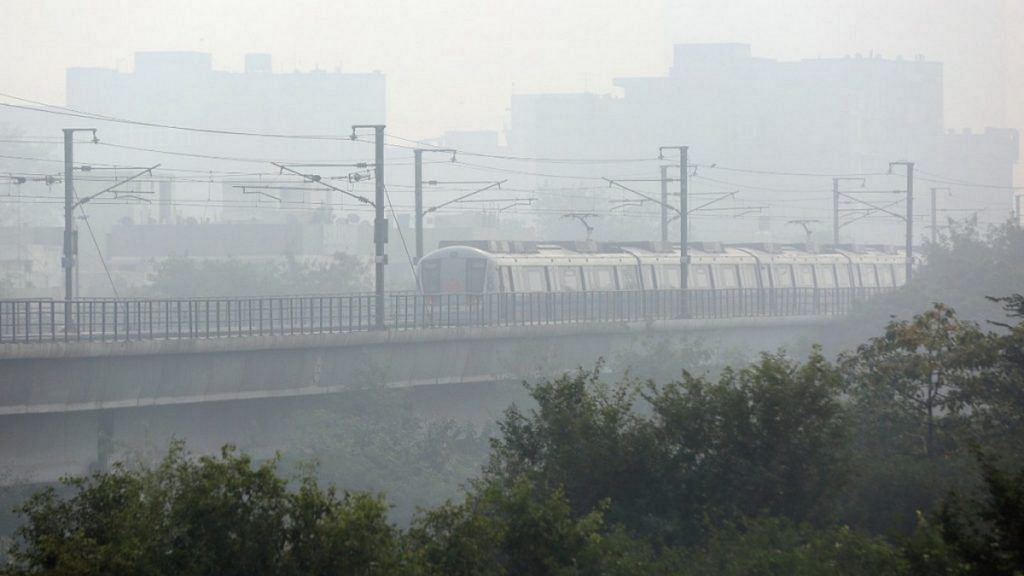New Delhi: Poor air quality has long been a major cause of medical problems, with the World Health Organization stating that its range of effects include increased “hospital admissions and emergency room visits [and] increased risk of premature death”.
And now, as the coronavirus pandemic — primarily a respiratory disease — continues to persist across the world, a new study has linked air pollution to 15 per cent of the world’s Covid deaths.
Published by Cardiovascular Research, an international journal of the European Society of Cardiology, on 26 October, the study drew information from the US and China and characterised “global exposure to fine particulates based on satellite data” to calculate the degree of Covid mortality that can be attributed to air pollution.
Also read: SC puts order appointing Justice Lokur to monitor states on stubble burning in abeyance
‘No vaccine against poor air quality’
The study stated that air pollution could be contributing to 15 per cent (keeping a confidence interval of 7–33 per cent) of Covid deaths globally. It contributes to 27 per cent (13–46 per cent) Covid deaths in East Asia, 19 per cent (8–41 per cent) in Europe and 17 per cent (6–39 per cent) in North America.
“If both long-term exposure to air pollution and infection with the Covid-19 virus come together then we have an adverse effect on health, particularly with respect to the heart and blood vessels,” paper co-author Thomas Munzel said. The professor at the University Medical Center of the Johannes Gutenberg University, Mainz, added, “So we have a double hit: air pollution damages the lungs and increases the activity of ACE-2, which in turn leads to enhanced uptake of the virus.”
“It seems likely that fine particulates prolong the atmospheric lifetime of infectious viruses, thus favouring transmission,” the study notes.
However, while the authors stress on the fact that air pollution alone is not responsible for Covid deaths, they refrain from ruling out “such a cause-effect linkage”.
Jos Lelieveld, a co-author of the paper, said the pollution particles “are a co-factor in aggravating the disease” and attributed 6,100 coronavirus deaths in the United Kingdom and roughly 40,000 in the United States to air pollution.
Underlining the need to transition to a green economy of clean and renewable energy sources, to mitigate the effects of not just the pandemic, but also climate change, the authors stress that, pandemic or not, air pollution will continue killing people.
“The pandemic ends with the vaccination of the population or with herd immunity through extensive infection of the population. However, there are no vaccines against poor air quality and climate change. The remedy is to mitigate emissions,” the study stated.
Also read: Stubble burning still a problem, but let’s control Delhi’s internal pollution, says Gopal Rai
India’s battle with air pollution
Northern India witnesses particularly poor air quality especially in October and November. While it is triggered by paddy stubble burning across Punjab, Haryana and Uttar Pradesh, the dip in temperatures, the lack of open space for particulate matter to dissipate, industrial and vehicular pollution and festivities such as Dussehra and Diwali all play a role.
Reports have stated that India is home to 21 of 30 most polluted cities in the world, with Ghaziabad in Uttar Pradesh topping the list.
According to the State of Global Air 2020 by the US-based Health Effects Institute, “Long-term exposure to outdoor and household air pollution contributed to over 1.67 million annual deaths from stroke, heart attack, diabetes, lung cancer, chronic lung diseases and neonatal diseases in India in 2019.”
As of 27 October, India has recorded more than 79.4 lakh Covid cases, of which 6,25,857 are active, while 1,19,502 people have died of the infection.
Also read: 65% Delhi-NCR households already experiencing pollution-related ailments, finds survey
